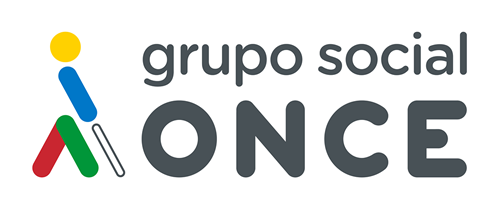 Stories to spread ilusion
Stories to spread ilusion
- SpanishES
- CatalanCA
- GalicianGL
- BasqueEU
- EnglishEN
Nacho Pista in “We will win this match"
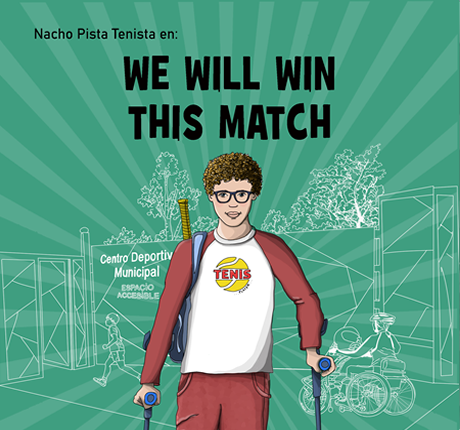
© Un trabajo de CON CAUSA con: Maru García Ochoa y Eva Latonda © Texto e Ilustraciones: Maru García Ochoa
Introduction
Think
about when you started doing sport...
I bet it was a long time ago. In nursery you did
psychomotor skills
and then, when you started school, gym classes and the famous extracurricular sports: swimming, tennis, football, basketball, skating, rugby, paddle tennis... Phew, there are so many that sometimes you don't know what to choose. But as time goes by, there's always
something you like more and that you're better at, so you sign up and train for that sport you love, it's as easy as that.
It ought to be the same for people with disabilities. Sometimes there are difficulties in accessing classes, a shortage of teachers with specific knowledge and, most importantly, we need
to pay more attention
to this need and continue to strive towards an
accessible world, for everyone. That’s why we want to tell you more about
Nacho,thecharacterfrom
"Nacho Pista, Tennis Player". He has now grown up and is a capable and willing 16-year-old who has devoted himself to tennis, without giving up his studies of course. He has
spina bifida. If you already know who he is, you will know what spina bifida is, but we will explain it again: spina bifida is a condition that affects the spinal column and can lead to physical and, in some cases, intellectual disabilities, ranging from mild to severe.
Nacho walks with crutches and plays wheelchair tennis. Playing sport from a very young age has instilled him with values such as dedication, overcoming obstacles, perseverance and sportsmanship. In addition, his disability has been an obstacle race that he has had to surmount, and which has given him extraordinary physical and mental strength. This combination has made him a role model for family and friends.
His next goal is to win a Paralympic medal; meanwhile he continues training hard, studying and, among other things, he has qualified as an instructor in order to give classes to children. Quite a journey.
This story also involves Regina, another of our characters that you may know from the story "Regina he Cooking Whiz". She has also grown up. She has deafblindness and a YouTube channel. She cooks and travels the world creating recipes. She is also the inspiration for Gela, Nacho's little sister, a very inquisitive girl who loves healthy food and is always coming up with new and original meals for Nacho. Gela understands how important good nutrition is for an athlete.
The characters in the "Stories to Spread Ilusion" are children with a disability who want to get to know you and share their adventures with you. Will you join in?
Today I woke up more tired than usual. I know we were training hard on the court yesterday and that's probably what it is, but sometimes when I'm like this I don't want to get up.
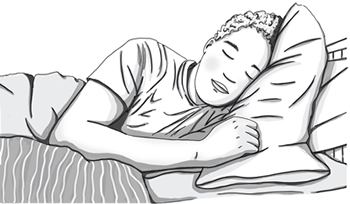
The thing is that today is a really important day because I'm getting a new chair for playing. I've got a lot bigger recently, a growth spurt, they say, and so I needed to get a tailore-made one.
It's really awesome; I've been told that
the turns I can make with it will improve my pace of play.
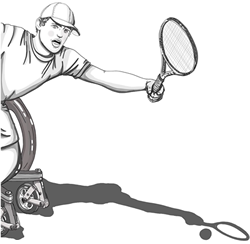
I'll be able to accelerate my reaction speed, and that, together with the fact that I'm getting very strong, is going to push me up in the national ranking, I'm sure of it.
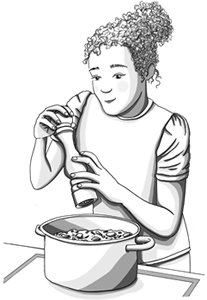
My little sister says I am getting stronger because of the special meals she makes for me, like her "Top-win" Paella, "Deuce" Cannelloni, or "Reverse Cut" Steak with "Advantage" potatoes, which are dishes she invented with me in mind.
Gela loves cooking and preparing recipes that she finds on the internet. It makes me laugh because I'm not very good at cooking.
One day she showed me the account of a girl she follows on social media and who is amazing, her name is Regina.
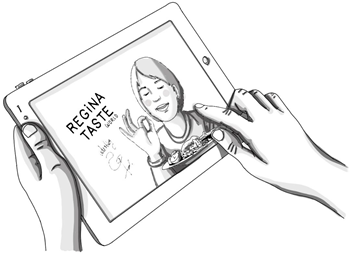
- Look Nacho. Regina has a disability, like you, but different; she is deafblind. And you know what? She's a chef and on her channel, as well as recipes, there are videos of her travels around the world trying all kinds of dishes. When you have to go to tennis tournaments in other countries, I'll go with you. I'll pay my trip myself," she says, "but I have to go. You'll need my special meals to win, and I'll discover new ingredients and flavours.
Thinking about it, it's not a bad idea because
my dad gets really nervous whenever I play a game, and
mum, I know she acts like everything is fine and there' s nothing to worry about, but when she sees me struggling on the court,
sometimes she gets worried, so... yeah,
Gela is the best option.
She's so funny and kind. When I lose a point and I see her smiling and cheering me on from the stands,
it gives me a lift that encourages me to keep on going.
- Nacho, come on, you have to go and get the
new chair
and then you have the
first day of the practical training
as a monitor.
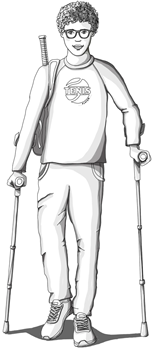
It's
Dad
talking to me from the living room. I forgot,
today I'm starting my practical training as a wheelchair tennis instructor. I've taken a course to be able to give lessons. I really want to
be able to teach others to enjoy the sport as much as I do. Although I have to make it clear that I am not going to give up my
Paralympic dream. I will continue training and competing until I win a
medal, it's a promise I have made to myself.
Tennis is my life, my passion and my purpose. Thanks to my parents, I was able to embark on my tennis journey when I was younger, but it wasn't easy. In my town I wasn't allowed to join the city council tennis classes because the teachers didn't realise that they only had to teach me the same as the others and to learn the rules of the game for wheelchair tennis, nothing else.
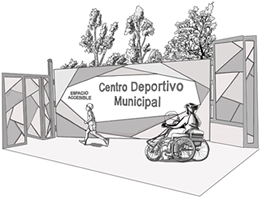
Just to be clear, wheelchair tennis is played on the same courts and with the same racquets and balls as everyone else.
What needs to happen is that access to the courts, changing rooms, toilets or any other space or service in the sports centre should be made available to someone with a disability.
This is called accessibility and it is essential that it is taken into account everywhere, and it is necessary to think not only about steps, switch heights or bathrooms with adaptations, but also about many other things, such as technology, leisure, studies... On the plus side, there is more and more social awareness, and that's great, because that's what will ensure that we all have the same opportunities. "Ensuring “everyone’s access to everything" is a win-win game.
Oh, something different about wheelchair tennis is that, during play, the ball can bounce twice before being returned, which means that I can play with someone without a wheelchair, train, have fun and even participate in a tournament.
If my school or my town had known this, then mum, dad and I would have saved many hours on the road, gallons of petrol and loads of study time in the car.
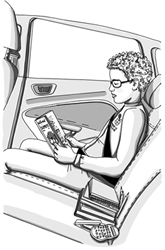
Sport has given me so much that I want to help every child with a disability to start playing as soon as possible.
My practical training starts today at my school, where I studied, but I couldn't play tennis. Nowadays, things have changed a lot. In the first year of secondary school there is a girl with the same name as my sister, Angela, who uses a wheelchair.
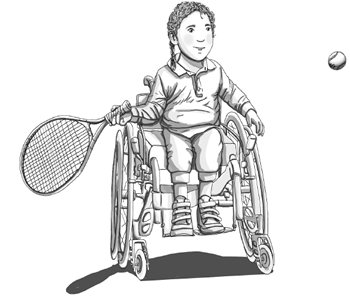
She is taking
extracurricular
tennis lessons with her classmates, and they have
a great instructor
who teaches them and who has been able to successfully integrate her students,
ensuring that everyone participates, learns and enjoys tennis together.
I'm going to have a great time learning how to teach tennis with them, I'm sure.
- Nacho, sweetheart, your father is getting stressed out.
Oops... ha, ha, ha, ha, ha! Me too now that I think about it.
My mother has peeked
into my room, laughing, to remind me that I have to go, and as I get up... wow, I realise that
I don't feel tired anymore.
"Let's go, Nacho", I tell myself as if I'm in a game.
Today is a big day,
let's play it, let's win it.
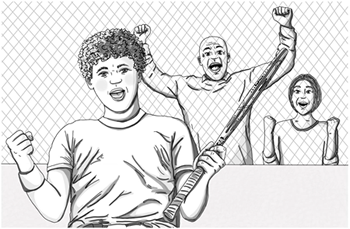
The End



